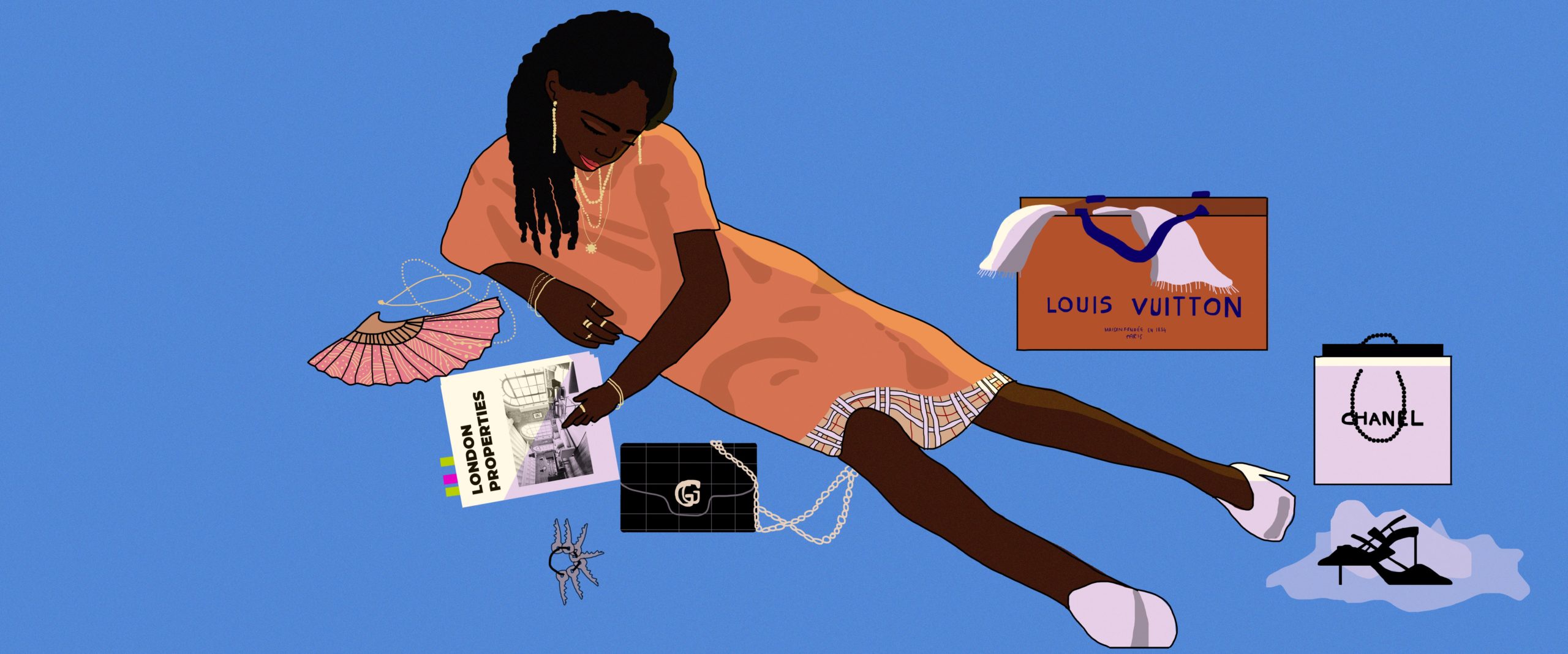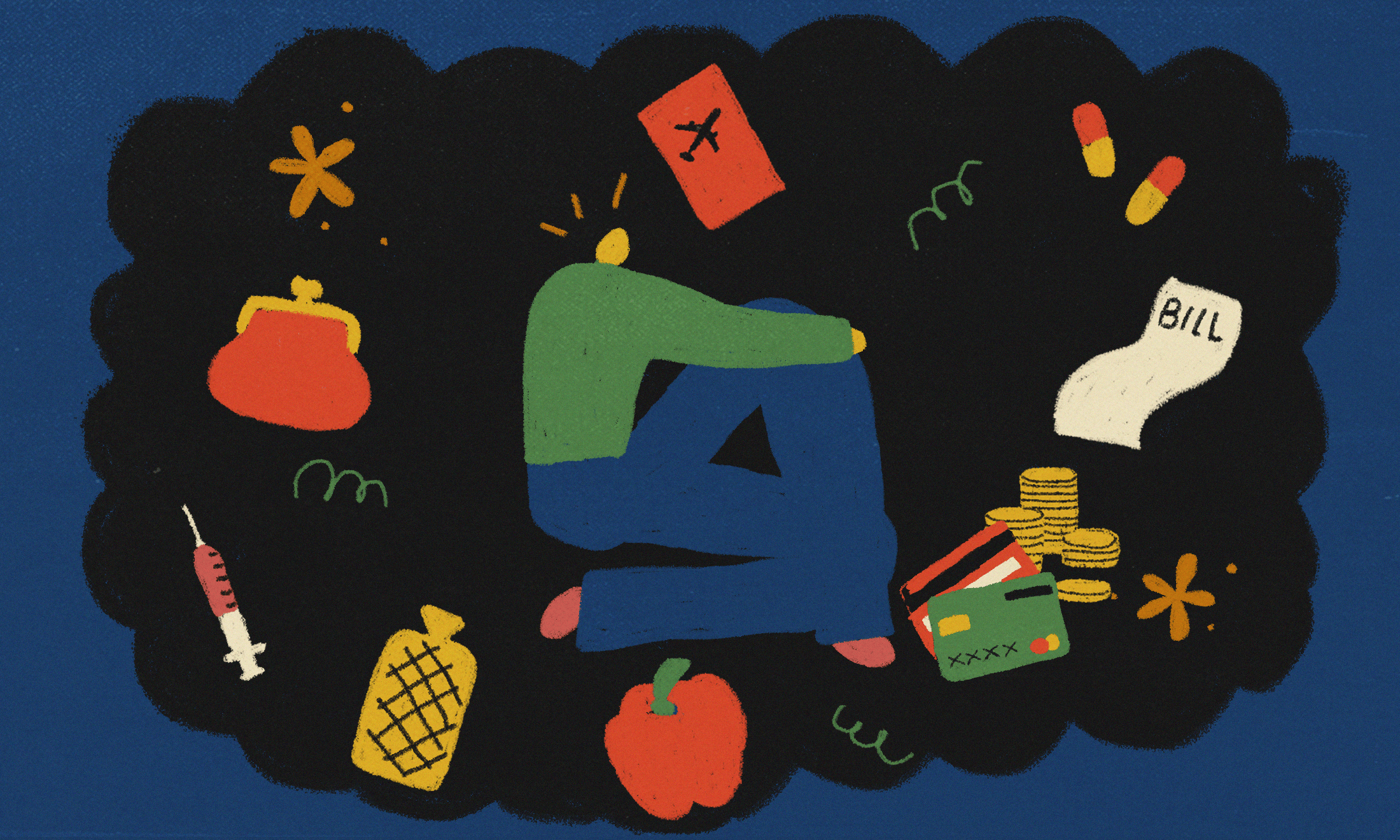
Serina Kitazono
Living lavish: How Black capitalism took over the conversation
Black people need to remind ourselves of why individually securing the bag never leads to liberation for all.
Nonhlanhla Makuyana
21 Dec 2020
Illustration by Serina Kitazono
Does Black liberation look like one auntie owning 44 properties? That’s the argument that erupted on social media last month after a Twitter user proudly posted about a relative who had become a one-woman property magnate. For my part, I was firmly on the side of the Black Twitter user who responded by saying: “house hoarding isn’t something to be proud of”. But the conversation pointed to a wider, divisive debate taking place among Black young people right now: a tension between securing-the-bag and socialism. Which ideology is best for attaining Black liberation?
As someone who identifies as a socialist economist but also loves ‘nice’ things, 2020 has brought a climax to the dilemma I face in juggling the two. How do you survive in a capitalist system without reinforcing the dog-eat-dog worldview? Why has “rise and grind” culture become so intoxicating, even for a generation of left-leaning young Black Brits? And what can its prevalence tell us about the daily realities of young Black people in an ever more volatile and precarious capitalist system? This year has been dominated by conversations about Birkin bags, Dubai and property ownership. Black capitalism has well and truly been on the agenda.
An insecure generation
At its heart, the secure the bag mentality is about stability and freedom. Asking friends and peers what securing the mythical bag would mean to them, quickly threw up a theme. “Well-paying jobs without weird, racist exploitation vibes,” one told me. Another said their ‘bag’ was “a gorgeous place to call home that I don’t share with a million other people, live with racist housemates and my rent doesn’t eat up my salary”. A third simply told me it was knowing they were sorted and secure enough to “treat” themselves, their friends and their family. Ultimately, to secure the bag is to have abundance, safety, comfort, security and pleasure – something that seems harder and harder to achieve as young Black people in modern, capitalist Britain.
Many of our experiences are marked by constant precarity, be it precarious housing or precarious employment. 2020 has seen people adapting to survive during the Covid-19 pandemic, a virus that poses the greatest health risk to Black communities and with an economic fallout that will also hit Black people hard. For some though, it’s not even present precarity that prompts an adherence to securing the bag – it’s the memory of childhood financial insecurity that haunts them and drives an understandable desire to build.
Deliberate obliteration of the UK’s welfare system has made it harder generally for households to claim government support while an increasingly shaky labour market is also a concern. Even before Covid-19 arrived, Black people were more likely to be working on zero-hour and short term contracts, while simultaneously being paid an average 7.7% less than white British people. There is no surprise then, that Black young people are focused on securing the bag of stability, safety and comfort in order to liberate themselves from the systemic conditions of insecurity.
“The rise and grind myth erases the context of the economic system, the factors that mean that Black people face significant economic blocks to ‘securing the bag’”
But this golden lottery ticket is a false promise. The rise and grind mindset is built on the premise that hard work equals success. This reinforces the capitalist myth of meritocracy; that an individual’s economic position positively correlates with how talented and hardworking they are.
If that were true, why do white households in the UK have average incomes that are 63% higher than Black households? Why are African aunties and uncles, juggling two jobs and 12 hour days on NHS wards and care homes, not yet billionaires with portfolios that rival Mark Zuckerberg’s? Do we really think that Boris Johnson’s wealth means he has worked harder than the likes of the striking cleaners of Lewisham Hospital?
This myth completely erases the context of the economic system and the factors that mean that Black people face significant economic blocks to “securing the bag”. Continuing to subscribe to the illusion that hard graft will equate to equivalent success for Black people places the blame and responsibility on the individual to win at a rigged system instead of playing a completely different game.
It’s understandable that, in an era of representation politics, the game of capitalism seems very appetising to young Black people. Every other day we have tweets informing us of the Black people who are the ‘first’ to be in institutional positions of power and status, such as the first Black shadow justice secretary (aka ‘minister for prisons’) or the first Black director of Louis Vuitton.
Representation politics tells us that Black people can be and do anything. In reality, only a handful of people are put in those positions, which uphold suss institutions, corporations and the status quo – all while still being racialised. Kamala Harris might be the first Black vice president of the United States and has faced extensive racist attacks – but that doesn’t mean she challenges the system in favour of people of colour. There’s a reason she once referred to herself as “top cop”.
This all brings to mind that viral tweet, featuring a picture of two Black people standing outside a prison. “BLACK OWNED”, read the caption, implying that they had just bought the facility (in fact, the person who posted the picture had won a restaurant contract with the prison). But the image encapsulates my perspective on the issue: that Black individuals buying into the rigged game of capitalism ultimately results in propping up institutions and corporations which, at their core, do not care about Black lives – only profit.
More often than not, modern narratives of Black capitalism point to class divisions that exist within the Black communities. Often, these fault lines are too easily dismissed. The bastions of Black capitalism tend to be those from Black middle class people who reinforce ideas of individualism and meritocracy.
A perfect example of this is a conversation I had with an African auntie who was an aspiring Conservative MP. She asked why I didn’t just discard my left-leaning politics, join the Tories and rise up through the ranks to secure the bag. To her, success looked like lining my own pocket. But for me and many other young Black working class people, securing the bag means liberation for all.
Contextualising the economic system
History has shown that no matter how hard Black people rise and grind, we still face significant obstacles in liberating ourselves from precarity. It’s not an accident; modern economic infrastructure was created in the 1600s, when Europe conquered Africa to exploit its population as labour and its natural resources as raw materials. This meant unlimited labour and resources at very little cost. As Europe’s pockets, and colonised territory, grew bigger, the industrial revolution whirred into motion and economic institutions like the Bank of England and Barclays bank were set up.
Enslaved Africans were traded as human livestock and became a key part of modern capitalism. The “stock market” as an economic instrument was developed so that Africans could be traded alongside other commodities such as sugar, tobacco, silks and textiles. Archived colonial documents from the Kimberly mines in South Africa even show that slave labour as a means of organising the economy was expected to last forever, alongside the domination of Black people.
The capitalist system we operate within today is the same one that saw roughly 40.3 million Africans dehumanised, their individual value reduced to the equivalent to a bundle of silk in the eyes of white merchants, bankers and insurers. The system is hardwired to exploit Black labour and resources, while the colonial centre grows in stolen wealth.
Examples abound: the exploitation of Black workers in low-income, precarious jobs in the UK, the ruthless extraction of oils in our sacred lands, such as the Niger Delta, and the prison industrial complex that underpins America, which sees Black lives commodified in a direct continuation of the slave economy. Even though the days of chattel slavery have passed, the legacy is still very much present in the way that the economy is organised.
So when aspiring Black banker bros talk to me about becoming billionaires and how this will liberate them from precarity, I’m doubtful and, frankly, perplexed as to why someone would want to win at this system instead of tearing it down and building alternatives. In the words of artist Bree Newsome: “No one becomes a billionaire without exploiting other people’s underpaid labour or unpaid labour.” Black capitalism isn’t liberation for all, it’s liberation for the very few. Is that success?
Alternative paths to liberation
No examination of the development of Black capitalism is complete without the parallel stories of Black anti-capitalist resistance movements. Through keeping us chasing after the bag and working ourselves to the bone, capitalism puts blinkers on our eyes about what is possible – whilst simultaneously erasing the visibility of movements that show us that there has to be another way.
An example that haunts me is the devastation of America’s ‘Black Wall Street’ in Tulsa in 1921, where Black Americans who were divesting from the exploitation of their labour were massacred by the KKK for daring to dream differently. Because when we collectively divest from capitalism, we threaten capitalism.
During the course of my work at Decolonising Economics, I have the pleasure of uncovering the histories of Black communities resisting capitalism, which are also called ‘solidarity economic movements’ (SEMs). These look like mutual financial aid – such as when freed slaves would pool funds together to save up to buy the freedom of a still-enslaved peer, a process that would go on indefinitely.
One of the most relevant SEMs for Black people in 2020 and beyond is the cooperative movement. A cooperative, defined by Black economist Jessica Gordon Nempart, is; “An autonomous association of persons united voluntarily to meet their common economic, social and cultural needs and aspirations through jointly-owned and democratically – controlled enterprise.”
In the UK, the cooperative movement (a similar set up to parallel community initiatives like Pardner or Susu) was instrumental in supporting the Windrush generation when they reached the hostile British shores and couldn’t get access to loans, jobs and housing. Black people developed “credit unions”, with the very first union set up in Hornsey in 1964 by West Indian migrants. These unions – which were collectively owned banks where individuals could contribute to a collective pool and members or the community could withdraw and invest from – allowed the Windrush generation to rent and buy houses without being forced to turn to exploitative loan sharks.
“Even while Black capitalist narratives dominate social media discourse, community wealth movements are being continued by a new generation of Black young people”
Right now, across the global south and in migrant communities, this model of community wealth building is utilised by Black communities. Community wealth building, as opposed to individual wealth and profit as a model, recognises that to free ourselves from precarity is to invest in each other, instead of in extractive systems, institutions or corporations. Coming together to make sure we all have access to good quality housing, healthy working environments and substantial, sustainable food sources – that to me is living lavish.
Even while Black capitalist narratives dominate social media discourse, community wealth movements are being continued by a new generation of Black young people. In February, entrepreneur Jermaine Craig launched non-profit company Kwanda where people can join as a “villager” for the monthly contribution of £1. Pooled contributions then go towards funding projects that aid Black communities, like therapy for Black women or scholarships for Black UX students, with villagers voting on where they want their money to go.
During the height of the pandemic, we also saw organiser and activist Eshe Kiama Zuri reclaim the Black Mutual Aid movement to support Black communities facing precarity as a result of Covid-19. Community funds like the QTIBIPOC Hardship fund, are offering Black individuals, and other people of colour, alternatives to grab-and-go capitalism.
We don’t have to abandon the fun of lavish living altogether. Shaking down capitalism isn’t about depriving people of nice things. But in 2021, let’s start thinking more broadly about just how limited the rise and grind life is for Black people and begin investing in the community bag instead.







